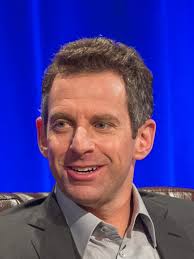Publicly challenging religion in the United States is impossibly difficult. It necessitates that one stand up to an outraged public backed up by millennia of tradition and power. Just questioning the truth of revered texts such as the Holy Bible, Koran, and Old Testament is enough to incur the wrath of two-hundred million Americans. As a result, most critics of Religion choose to moderate their rhetoric and their arguments, suggesting courses such as mutual respect and tolerance. Unfortunately, the propositions of such moderates are logically inconsistent. They suggest that each person should believe what they please while not trespassing on the ability of their neighbors to do the same. But how can this be? Either a person must believe that his faith is unerringly true and right or he cannot truly believe and have faith in it. The logical corollary of one faith being held as true is that others mutually exclusive with it must be false. This is exactly the position that Sam Harris takes in An Atheist Manifesto. Choosing to adhere to logical consistency rather than political moderation in his scathing and merciless critique of people with faith, Harris dooms his own goals of religious erasure and world peace.
Pursuit of logical coherence
First, in his pursuit of logical coherence, Harris alienates the very segments of society that might have supported his viewpoints. It is evident to any reader that Harris’s essay is persuasive in nature. His goal is to convince the reader that they should reject religion as factual truth. However, the rhetoric of the entire piece calumniates religious adherents, the only group whose conversion to atheism would strengthen Harris’s cause. He repeatedly calls them “irrational” by direct and indirect means, suggesting that logical people and religious believers are mutually exclusive groups of people. To make matters worse, Harris goes on to label religious worshippers as filled with “boundless narcissism and self-deceit”. Even if readers can calmly accept these insults to their faith, Harris goes so far as to shatter any remaining semblance of dignity believers can fall back on while trying to swallow Harris’s tirade. He argues that not only are their occasional demonstrations of faith delusional but that because religion permeates a person’s entire life, they have only the “fantasy life” of a “madman or an idiot”. Harris finally crushes his last hope of garnering goodwill from his readers by failing to acknowledge the obvious truth that many believers are simply the inevitable product of their upbringing, that their faith is not a fault of their rationality but of their ancestry.
Beleaguering potential converts
In addition to beleaguering potential converts, Harris annihilates any hope of political liberalization by declaring his stark opposition to potentially allied groups. He attacks two groups of moderates. The first advocates mutual tolerance, with the end result being the removal of religion from the public sphere. If every believer kept his faith in his home then no social or political harms could result from it. The second holds the position that while there is no logical defense of religion, it is socially beneficial and comforting for people to believe in. Harris, however, instead of reaching out to these groups, bluntly states that they are in fact more irrational than religious extremists.
 According to Harris, “fundamentalists tend to make a more principled use of their brains than moderates’ doliberal piety is apt to produce the most unctuous and stupefying nonsense imaginable.” Here, again, it can be seen that the prevailing cultural dominance of religious faith has created a lose-lose situation for critics like Harris. Either they are forced to betray their own principles and adopt a path of political expediency, or they are forced to doom the goals of their cause for the sake of consistency. While only a coalition of moderates has the power to prevent the encroaching power of the religious right from staining government, the moderates’ position denies the obvious extrapolation of their starting premise. If religion cannot be properly justified, then people ought to renounce it.
According to Harris, “fundamentalists tend to make a more principled use of their brains than moderates’ doliberal piety is apt to produce the most unctuous and stupefying nonsense imaginable.” Here, again, it can be seen that the prevailing cultural dominance of religious faith has created a lose-lose situation for critics like Harris. Either they are forced to betray their own principles and adopt a path of political expediency, or they are forced to doom the goals of their cause for the sake of consistency. While only a coalition of moderates has the power to prevent the encroaching power of the religious right from staining government, the moderates’ position denies the obvious extrapolation of their starting premise. If religion cannot be properly justified, then people ought to renounce it.
Second, An Atheist Manifesto ignores the positive powers of religion to do good in the world. One of the author’s final goals is the alleviation of human suffering. He makes multiple references to the evils of international violence, ethnic conflict, and domestic crime, all of which impact to human suffering. In his relentless critique of religion, Harris overlooks the reality that religion can and has been a major force of charity around the world. Church-based charities raise millions of dollars and thousands of volunteers every year to help combat poverty, disease, and conflict around the world. Many faiths also preach peace, love, and generosity towards fellow human beings.
Religious rhetoric also serves as an unmatchable force of human inspiration.
Almost every famous speech in history, from those of Abraham Lincoln to Martin Luther King Jr., makes references to divinity. Such masterpieces would lose a sizable portion of their captivating and motivational power were they stripped of references to something greater than man himself. These uses of religion have brought about some of the most needed changes in history, from the abolition of slavery to the insurance of equal rights. Faith is even more inspirational on an individual level. For millions of people living in unbearable conditions, God provides the strength to continue fighting on everyday. How many more of Hurricane Katrina’s victims would have resigned themselves to death if they did not believe that they had the backing of “an omnipotent, omniscient and compassionate God”? It is safe to say that religion is directly responsible for many of history’s greatest deeds.
Third and finally, Harris’s unrelenting consistency only increases the probability that human beings will suffer at one another’s hands. The biggest step for peace between warring religious factions has been the acceptance of mutual respect, not the waning of religious faith. Peaceful Muslims and Jews in the Middle East have not renounced death and destruction because they have lost faith in their respective Gods; they have come to believe that their faiths are compatible to peaceful co-existence, peace-loving, and tolerant of dissenters. Harris, however, denounces such approaches as futile and asinine. It is obvious to anyone who has read religious texts that “our religions are intrinsically incompatible with one another.” Because the stakes of heaven and hell are so high and so eternal, any religious believer should find it “reasonable to kill them [heretics and unbelievers]”. Although Harris’s intent here is commendable, his probable results are not. The religious reader, when forced to choose between the two extremes as posed by Harris, is much more likely to follow through with his or her faith than to repudiate it altogether. A second path to peace with a proven record of success, spreading economic prosperity, is blatantly rejected by Harris. He cites as his evidence the nine-eleven terrorists who were well-off and well-educated. While his evidence is indisputable, his logic is not. For a majority of the developed world, religious coexistence is not a problem. Muslims, Jews, Christians, Buddhists, Hindus, and people of all faiths live peacefully as friends and partners in numerous Western nations. It is only in poorer countries where young men cannot find livelihoods and are brainwashed with hatred for the West where terrorism and violence breed. As such, Harris helps to shoot down the most potent weapons of human peace, mutual respect and economic security.
Overall, the sincerity and coherence of Harris’s essay cannot be doubted. At no point in the article does Harris compromise his principles for the sake of expediency or utility. Unfortunately, in the social and cultural context of today’s world, this kind of intellectual rigor is condemned to not only fail to spread its message, but to worsen the very problems it seeks to rectify.
Harris, Sam. An Atheist Manifesto. Feb 8, 2006. Truthdig.






